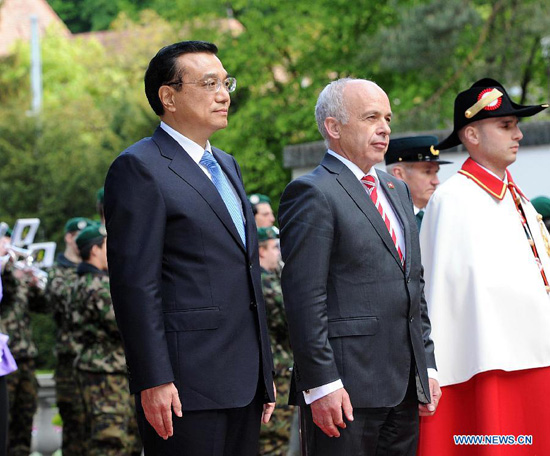李克强在瑞士《新苏黎世报》发表署名文章(全文)
Full text: Li Keqiang's article published in Swiss newspaper
| 5月24日,中国国务院总理李克强在伯尔尼出席瑞士联邦主席毛雷尔举行的欢迎仪式。[新华社 李涛 摄] Chinese Premier Li Keqiang (L) attends a welcome ceremony held by Swiss President Ueli Maurer (C) in Bern, Switzerland, May 24, 2013. [Li Tao/Xinhua] |
|
《为什么选择瑞士》 瑞士是我就任中国国务院总理后出访的第一个欧洲国家。在中国文化中,“第一次”总是具有象征意义。我选择瑞士并非偶然,因为有几件重要的事情要做。这几件都是中国对外开放具有标志性的大事,也都与瑞士有关。 其一是推动中瑞自贸区进程。2010年我访问瑞士时,双方一致同意加快建立自贸区的准备工作。三年多来,两国的相关部门一直紧锣密鼓地推进谈判,进行了九轮并最终结束了谈判。迈出这一步,瑞士将成为欧洲大陆和世界经济20强中首个与中国达成自贸协定的国家,其意义非同一般。 去年,中瑞贸易达到263亿美元,其中瑞士对华出口228亿美元,如果平均到每个瑞士人就是2800美元。达成一个高水平的中瑞自贸协定,中国付出了很多努力。这充分说明,中国对外开放的步伐不会停顿,中国坚持维护多边贸易体制、积极推动区域贸易自由化、加快实施自由贸易区战略的决心坚定不移。达成一个高水平的中瑞自贸协定,也等于是树立一个好的标杆,不仅会促进两国经贸合作全面升级,而且会向世界发出反对贸易和投资保护主义、倡导贸易自由化便利化的强有力信号,给中欧经贸关系深化带来新的动力,给两国消费者和企业带来实实在在的好处,也有利于世界贸易振兴和经济复苏。 其二是加强双方金融领域交流与合作。瑞士长于金融,管理经验丰富,被称为银行密度最高的国家。与瑞方加强金融监管、宏观政策和完善资本市场体系等方面的合作,是中国开放型经济发展的客观需要。中国正在深化金融业改革开放,包括稳步推进利率市场化改革以及人民币资本项目可兑换、建立个人投资者境外投资制度、完善金融监管机制等,这将为两国金融企业互动发展提供新的机遇。同时,中瑞可以在国际货币基金组织、世界银行等国际金融机构中携手合作,为维护国际金融稳定和促进世界经济增长发挥“1+1大于2”的作用。
|
Why Switzerland? Switzerland is the first European destination on the list of countries I will visit after becoming China's premier. In Chinese culture, being "first" always carries symbolic meaning. My choice of Switzerland is in no way haphazard: we have got a few important things to do here. They are all landmark events in China's opening-up, and they all have something to do with Switzerland. The first job is to secure progress in the building of China-Switzerland FTA. It was during my last visit in 2010 that the two countries agreed to speed up preparations for an FTA. Over the past three years and more, the relevant departments and agencies of the two countries have worked energetically in the negotiations, and reached the final conclusion after nine rounds of talks. With the advent of FTA, Switzerland will become the first country in continental Europe and the first of the world's top 20 economies to reach an FTA with China, the implications of which will be significant. Last year, two-way trade reached 26.3 billion U.S. dollars, including 22.8 billion dollars of Swiss exports to China. That is to say, every Swiss man, woman and child exported 2,800 dollars to China. To conclude this high-quality FTA agreement with Switzerland, China has made tremendous effort. It fully demonstrates that China will not stall in its opening-up and that it is firmly committed to upholding the multilateral trading regime, vigorously promoting regional trade liberalization, and accelerating the implementation of the FTA strategy. Moreover, a high-quality FTA agreement between China and Switzerland will also set a good example. It will not only upgrade our business and investment cooperation but also send a powerful message to the rest of the world that we reject trade and investment protectionism and instead embrace trade liberalization and facilitation. It will inject fresh impetus into China-EU business ties, bring tangible benefits to consumers and businesses in both our countries, and contribute to world trade and economic recovery. The second job is to step up financial exchanges and cooperation between the two sides. Switzerland boasts the highest density of banks. It has a strong financial industry and rich regulatory experience. Enhancing cooperation with Switzerland in financial regulation, macroeconomic policy making, capital market development and other areas is consistent with China's need for further development of its open economy. China is introducing more reform and opening-up to its financial sector, including steadily advancing market-oriented reform of the interest rate, making RMB convertible under the capital account, putting in place a system of overseas investment by individual investors, and improving financial regulatory regime. All this will provide new opportunities for interactions and growth of our financial firms. At the same time, China and Switzerland can work together at the International Monetary Fund, the World Bank and other international financial institutions, so as to make greater contribution to maintaining international financial stability and promoting world economic growth. The third job is to enhance mutual trust and understanding. How high we can go in developing our relations and our practical cooperation hinges on our ability to seize new opportunities, and more importantly, on whether or not we can reach a higher level of mutual trust and understanding. Switzerland is among the first Western countries to have established diplomatic relations with New China. The very first industrial joint venture China entered into after the beginning of reform and opening up was one with Switzerland. Switzerland is also one of the first group of European countries that recognize China's market economy status. All these constitute the basis of our mutual trust. But to go still higher, we need to do a lot more. I hope my visit here will not only deepen the understanding and trust at the leadership level, but also increase the awareness and recognition at the public level of our respective countries, thus planting more seeds of friendship for exchanges between the two peoples. |
 0
0 








Go to Forum >>0 Comment(s)